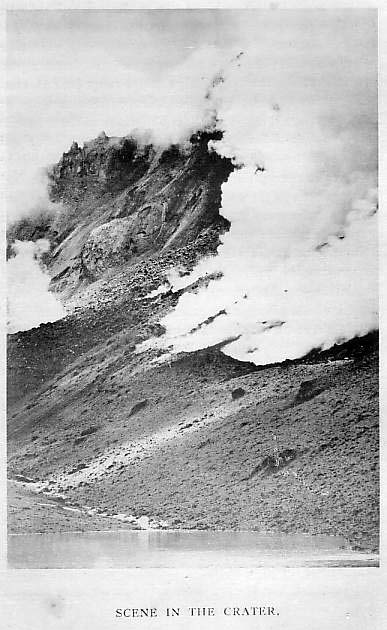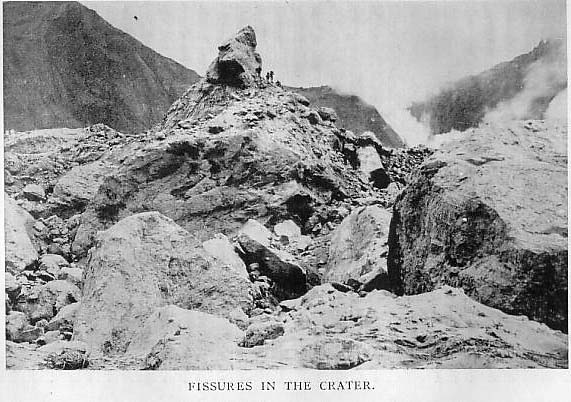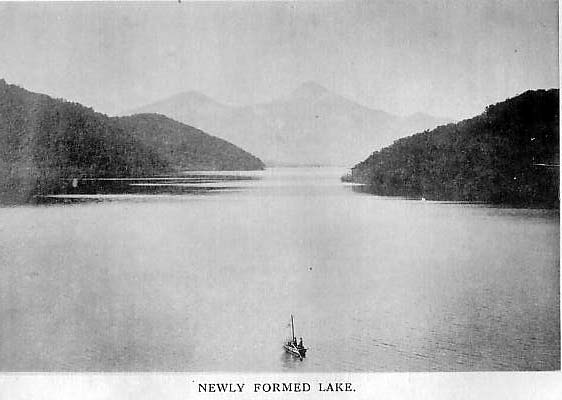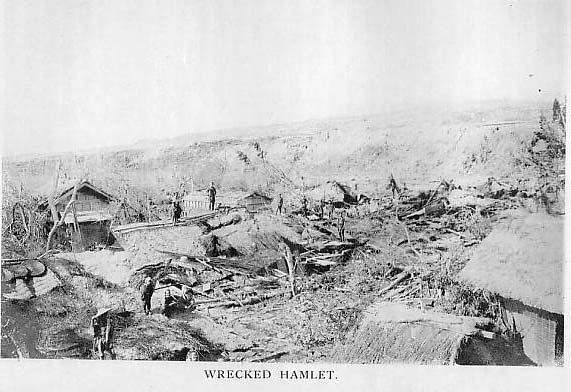The recent volcanic explosion in Japan
Tokio, 28th July 1888
A wide band of volcanic vents runs for some 450 miles through the northern half of this main island of Japan.
It is one of the four great lines which make up the volcano system of the Japanese archipelago.
It occupies the backbone of the island, and it includes between 40 and 50 peaks of distinctly volcanic character.
Most of these are extinct, probably for ever.
But some of them, doubtless, are only slumbering, and several others are active and giving off steam.
Of the last, the giant both in vigour and proportion is Asamayama, situated near the southern end of the chain.
The characteristics of that mountain, its remarkable crater and awful history were described by me in The Times a couple of years ago.
North-east of Asamayama, at a distance of about 40 leagues, is another active volcano, Bandai-san by name, of the second order of magnitude, and 5,800 feet in height.
Nearly eleven centuries have passed since this peak was last in eruption.
In that long interval, its volcanic features have been to a great extent obliterated by natural agencies, its crater broken down, its old lave-streams decomposed, and the whole covered from foot to summit with a rich growth of vegetaion.
On its north-east flank, however, there is or was a fortnight ago, a subordinate peak, Sho-Bandai-san, rising directly above a group of three solfatara.
In the existence of these hot springs, coupled with the recorded eruption of the principal peak within historic times, was recognised sufficient reason for including Bandai-san in the roll of still active volcanoes.
If any lingering doubts were felt as to the mountain's title of admission to that fiery fraternity, they have been completely dispelled by the latest experience.
At about eight o'clock on the morning of the 15th instant, almost in the twinkling of an eye, and by means of one of those most potent but happily rare manifestations of energy which seem to be our mother Earth's way of assuring us that she is still hearty, Sho-Bandai-san was blown into the air and wiped out of the map of Japan.
A few minutes later its debris had buried or devastated an area about half the size of London.
A dozen or more of upland hamlets had been overwhelmed in the earthen deluge, or wrecked by other phenomena attending the outburst.
Several hundreds of people had met with sudden and terrible death.
Scores of others had been injured; and the long roll of disaster included the destruction of horses and cattle, damming up of rivers, and laying waste of large tracts of rice-land and mulberry groves.
Such were the facts as to the explosion and its results which gradually reached the capital in the course of last week.
With them came thrilling reports of the tremendous sights and sounds that attended the eruption.
Evidently the whole catastrophe had been one after the manner of Krakatoa - on a vasty smaller scale, of course, but belonging to the same order of volcanic phenomena.
It was impossible to sit still in Tokio while the scene of such a great disaster was within fairly reach.
So a small party of explorers was quickly formed.
We went, and we have returned; and the following narrative will tell something of what we saw in our rapid but most interesting survey.

It took us two days to reach the foot of the volcano.
On the first, our journey, performed by railway, ended at a country town some twenty miles, as the crow flies, from Bandai-san.
Here, though neither earthquake nor noise had been experienced in the 15th, gloom and mist prevailed for about seven hours, the result of a shower of impalpable blue gray ash, which fell to a depth of half an inch, sorely puzzling the inhabitants as to its origin.
Next day, exchanging the railway for jinrikisha, we ascended gradually through a pretty broken country, exhibiting all the wealth of verdure and picturesqueness of outline which everywhere in the Japanese highlands lend softness and variety to the landscape.
For a while the weather favoured us.
Long before noon, however, we were met by a plague of hot wind and drenching rain, assailing us in those fierce, fitful bursts which in this country usually betoken a not very distant typhoon.
Wild squalls swept wrathfully over the surface of Lake Inawashiro as, on reaching the edge of the large plain at the foot of Bandai-san, we caught our first glimpse of the volcano, and were able to make out faintly, far away, the dull brown hue of its mud-deluged north-eastern slope.
It was a gloomy scene, on a gloomy day.
But hardly less gloomy than either the weather or the landscape were the faces of the still dazed and affrighted people dwelling in and about Inawashiro, the mountain village which was to be our head quarters during our stay.
Only a week before, these poor folks had fled westward from their homes and from the volcano's fury, some of them injured, others half-naked, and every countenance blanched with terror.
Though their village itself had been spared from destruction, a great wave of earth and rocks had swept down to within a thousand yards of it.
Showers of sand, hot water, leaves, and ashes had fallen all about them; and they had felt the full force of repeated earthquake shocks, so violent that the ground undulated "like the waves of the sea," while the fugitives, unable to stand, had at first to crawl away on all-fours.
Awe-stricken as they must have been by the recollection of that terrible morning, it is little wonder that these simple country folks had with difficulty been persuaded to return to their homes, or that they had not yet fully regained the cheerful spirits and gentle caress of manner which are natural attributes of even the humbler classes of Japanese.

To visit the newly formed crater, it was necessary to take a roundabout route, ascending the mountain by a back way as it were, from its southern slope.
To this our third day was given.
Of the climb little needs be said.
There was no difficulty - only four hours' steady going on a sultry July morning, and a total rise of less than 3,000 feet.
Once clear of the ash-covered neighbourhood of the village, our route lay through a scene of rich and tranquil beauty.
Only on nearing the end of the ascent were we again brought face to face with signs of the explosion.
Here, besides the rain of fine gray ashen mud which had fallen on, and still covered, the ground and all vegetation, we came upon a number of freshly opened pits, evidently in some way the work of the volcano.
We heard afterwards that Japanese experts are divided in opinion as to whether these are diminutive mine-craters blown out at the time of the general catastrophe, or cavities formed by the fall of great boulders burying themselves in the soil.
To our minds all the evidences seemed to point to the latter conclusion.
Ascending the last steep rise to the ridge behind Sho-Bandai-san, signs of the great disaster grew in number and intensity.
Fetid vapours swept over us, emanating from evil-looking pools.
Great trees torn up by their roots lay all around; and the whole face of the mountain wore the look of having been withered by some fierce and baleful blast.
A few minutes farther and we had gained the crest of the narrow ridge, and now for the first time looked forth upon the sight we had come to see.
I hardly know which to pronounce the more astonishing, the prospect that now opened before our eyes, or the suddenness with which it burst upon us.
To the former perhaps no more fitting phrase can be applied than that of absolute, unredeemed desolation - so intense, so sad, and so bewildering that I despair of describing it adequately in detail.
On our right, a little above us, rose the incurved rear wall of what, eight days before, had been Sho-Bandai-san, a ragged, almost sheer cliff, falling with scarce a break to a depth of fully 600 feet.
In front of this cliff everything had been blown away, and scattered over the face of the country before it, in a roughly fan-shaped deposit of, for the most part, unknown depth - deep enough, however, to erase every landmark, and conceal every feature of the deluged area.
At the foot of the cliff, clouds of suffocating steam rose ceaselessly and angrily, and with loud roaring, from two great fissures in the crater-bed, and now and then assailed us with their hellish odour.
To our eyes the base denuded by the explosion seemed to cover a space of between three and four square miles.
This, however, can only be rough conjecture.
Equally vague must be all present attempts to determine the volume of the disrupted matter.
Yet, if we assume, as a very moderate calculation, that the mean depth of the debris covering the buried area of 30 square miles is not less than 15 feet, we find that the work achieved by this last great mine of Nature's firing was the upheaval and wide distribution of no fewer than 700 millions of tons of earth, rocks, and other ponderous material.
The real figure is probably very much greater.

Around and below the crater all was a blank and horrid waste, literally an abomination of desolation.
Down the slopes of Bandai-san, across the valley of the Nakasegawa, choking up the river, and stretching beyond it to the opposite foot-hills five or six miles away, spread a vast billowy sheet of ash-covered earth or mud, obliterating every foot of the erstwhile smiling landscape.
Here and there its surface was dotted or streaked with water.
Elsewhere the eye rested on huge disordered heaps of rock debris, in the distance resembling nothing so much as the giant concrete block substructure of some modern breakwater.
It was curious to see on the farther side the sharp line of demarcation between the brown sea of mud and the green forests on which it had encroached; or, again, the lakes formed in every tributary glen of the Nakasegawa by the massive dams so suddenly raised against the passage of their stream water.
One lake was conspicuous among the rest.
It was there that the Nakasegawa itself had been arrested at its issue from a narrow pass by a monster barrier of disrupted matter thrown right aross its course.
Neither living thing nor any sign of life could be descried over the whole expanse.
All was dismally silent and solitary.
Beneath it, however, lay half a score of hamlets, and hundreds of corpses of men, womem and children who had been overtaken by swift and painful deaths.
The graves of some of the dead were, indeed, nearer than we thought.
We were standing immediately above the site of the group of solfatara already mentioned as having existed on the heights of Sho-Bandai-san.
At two of these, houses had been built for the accommodation of bathing-visitors, several of whom were staying in them on the fatal day.
And our guides, pointing in one quarter to a gable-corner projecting above the chaos just below us-in another to a spot farther down, on the very crater's edge, marked only by a few puddles and ragged stumps and rocks - told us that beneath these lay the little spa-hamlets Naka-no-yu and Shimo-no-yu, and the bodies of some 30 mud-smothered victims.
Only from the upper spring did any escape, and that was by reason that in this case the destroying matter issued, not from the great focus of disturbance, but from a milder eruption of the solfatara itself, which was situated well behind the crater.
The comparative immnunity enjoyed by this and other places at the back of the chief seat of explosion - as, for example, the slope by which we had approached the scene - coupled with other indications afforded by the catastrophe as a whole and verified by later observation, have convinced us that the disruptive force must in the main have been directed outwards from the hill-face at a considerable inclination to the vertical.
On no other hypothesis is it possible to account for some of the most startling phenomena, for the great distances reached by the waves of ejectamenta, and for the incredibly brief intervals that elapsed between the short-lived explosion and the submersion of large tracts, many miles away from the crater.
It must not, however, be supposed that the havoc wrought by the volcano's fury was limited to the fall of disrupted matter, or to the area covered by it.
Besides the rain of scalding earth and mud, heated rocks and stones, sand, and hot softly-falling ashes, there were the awful shocks of the explosions, accompanied by winds or whirlwinds which every survivor describes as of intense and extraordinary vehemence.
Nowhere, of course, were the effects of these concomitants more fierce than on the heights of Bandai-san.
I, for one, can never forget the weird spectacle presented by the forests on the unburied slopes above and near the crater.
In these hardly a stick was left standing.
As if some giant reaper had mown down whole acres with a sweep of his sickle, the trees lay literally in hundreds on the ground, all felled in a direction away from the crater, stripped of branches, leaves, and even of their bark, and twisted into the most grotesque contortions.
But it would fill columns to tell of all the strange and fearful things we witnessed in our long afternoon's scramble over those volcano wrecked heights.
Sufficient perhaps has been already said to give a faint picture of the scene, though I suppose we for our part shall always be sorry that time prevented a yet fuller exploration.
At least, however, we had seen enough to make us feel, as we trudged home, that the day had been for each one of us a greet day in his life, and that our faith in the immutability of the everlasting hills had been very rudely shaken.

Our forth and last day was given to exploring the buried area at its lower levels, in the valley of the Nagasegawa - till lately a happy prosperous dale, but suddenly converted on that sad summer morning into a veritable valley of the shadow of death.
At pehaps two thirds of a mile from our inn we reached the outskirts of the volcanic deluge.
Here a secondary earth-wave, issuing from the crater by a lateral gap, had rushed swiftly down the mountain side, burying a large party of grass-cutters and horses, and reaching, but only half destroying, the little hamlet of Mine.
Its energy seems to have been exactly spent at this point.
It was strange to see the great wall of earth and stones, with its vertical face some 7 or 8 feet high, brought up all standing, as it were, by a frail farm outbuilding.
A yet stranger sight was it to see the enormous masses of rock that were strewn about on the surface of the neighbouring field of mud.
One of them, which I measured, weighed at least 200 tons.
How they came there is an unsolved and, I daresay, insoluble mystery.
Higher up, on the far side of the river, we visited a couple of large villages, which, though not reached by any mud-stream, told a telling tale of other phenomena attending the outburst.
Here the voices of the earthquake, the concussion, and the rushing wind spoke to us in no uncertain tones.
Not a house was whole.
Many had been levelled to the ground; others were tottering on the verge of destruction; and of the rest, all were cracked, mutilated, unroofed, twisted, tilted up, or otherwise injured or partially wrecked.
A scene of more ruthless and utter desolation could hardly be conceived.
Yet higher, after recrossing the stream, we came to the village of Nagasaka. its buildings little harmed, though of its people two-thirds had met with a tragic end, to be presently described.
Beyond this, our route entered upon the great earth-field on which we had looked down the day before from the heights of Bandai-san.
Nothing could convey a more vivid idea of the destructive forces that were let loose upon that doomed region than a sight of the wild chaos of earth, rock, and mud which now reigns over its surface.
The whole effect in some places is much as if a raging sea of those materials, on a gigantic scale, had been suddenly congealed and made to stand still.
At one spot, not seen by us, there is a long earth or mud precipice said by some observers to be fully 200 feet high.
Happy indeed is it that the area was so thinly inhabited.
As it is, nigh upon 300 people perished, with their cattle and other living things.
The wonder is that out of such general havoc any man or house escaped.
Pitiful beyond all others is the story of the Nagasaka village, above mentioned.
The valley here is narrow, barely half a mile across.
On the side towards the volcano stands the village, on rising ground.
On the far side ran the river, there easily fordable.
Situated on a protected area, between the two great avalanches that descended from the crater, the hamlet itself was invaded by no earth-torrent.
Nevertheless, more than 90 of its inhabitants met their death - in this wise.
When Sho Bandai-san blew up, and hot ashes and sand began to fall, the young and strong fled, panic-stricken, across the fields, making for the opposite hills by paths well known to all.
A minute later came a thick darkness, as of midnight.
Blinded by this, and dazed by the falling debris, and other horrors of the scene, their steps, probably also their senses, failed them.
And before the light returned every soul was caught by a swift bore of soft mud, which, rushing down the valley-bed, overwhelmed them in a fate more horrible and not less sudden than that of Pharaoh and his host.
None escaped save those who stayed at home-mostly the old and very young.
One house we saw, of which all the inmates, ten in number, had perished thus.
Standing on the threshold of that desolated home, with all the scene before us, and with the tales of many survivors still fresh in our ears, we tried to pass in mental review the events of the memorable morning of the 15th.
It seems clear from every account that one of the most terrible features of the catstrophe must have been its appalling suddenness.
Though there had been, it is said, slight shocks of earthquake for a couple of days before, and, according to some witnesses, strange subterranean rumblings and suspicious variations in the temperature and volume of the hot-springs, these caused no grave alarm.
Nothing worthy to be called a serious warning occurred until about 7.30a.m. on the 15th.
Then came a violent earthquake, followed a quarter of an hour later by a second, yet more intense.
Ten minutes after, there ensued throes of such terrible severity that the ground heaved and fell, people were thrown down, and houses demolished or wrecked.
To all it seemed that their last hour had come.
Instantly upon this arose a fearful noise, described by some as like that of a hundred thunders, by others as the most unearthly sound that ever startled the ears of men.
Sho-Bandai-san was seen to be lifted bodily into the air and spread abroad, and after it leaped forth tongues of flame, and dense, dark clouds of vapour or ejectamenta.
Of the ensuing phenomena it is hard to gain any clear idea from the tales of the distracted survivors.
Apparently, however, a quick succession of reports, accompanied by violent earth-throes and winds of hurricane force, lasted for about a minute.
Then began the shower of ashes, dust, hot water, and leaves.
The light quickly faded as the exploded matter spread over the firmament, so that day was soon changed into night and did not return for a space of several minutes.
Meanwhile the avalanches of earth and mud must have already done much of their deadly work.
We gather, at least, from the narratives of the survivors at Nagasaka, and from other concurrent testimony, that the interval between the explosion and the arrival of the mud-torrent which swept past that hamlet cannot have been more than from 10 to 15 minutes.
Before the light was restored, all the flower of the village had been swallowed up.
How that long journey of some ten miles from the crater had been performed by the mud at such an astonishing speed it is impossible to say.
There is evidence that in places the earth-flow lasted for about an hour.
But in the above we have the clearest proof that some at least of the destroying matter was hurled over the country at railroad speed, even after being deflected through wide angles from its original line of motion.
A little way below Nagasaka, on a raised ridge in the drowned and wasted land, we came to a row of nameless graves, the "field of sleep" of 30 sufferers exhumed from the mud.
Of all those bodies, one only - that of a child - was perfect.
In every other case the features at least were destroyed.
And thus it was that the rude headboards came to be inscribed only with such simple epitaphs as, "No.17; one man; countenance unrecognisable."
It was the same story everywhere.
Sooner or later victims' bodies had been crushed, dismembered, or decapitated in the mad whirl of matter, stripped of every shred of clothing, and mangled beyond all recognition.
No attempt has been made in the foregoing narrative to enter into elaborate topographical descriptions, or to hazard scientific discussion of the observed phenomena, many of which are in the highest degree perplexing.
The one would be tedious, if not unintelligible, without the aid of plans; the other is and must be hopeless, in default of patient and skilled investigation.
There are many strange things to be explained-problems which will sorely tax the sagacity of Professor Sekiya and other experts already at work on the ground.
We may, perhaps, hope to learn something hereafter that will throw a clear light on the immediate cause of the explosion (the agent, it cannot be doubted, was steam), on the approximate volume of the projected matter, on the partiality of the effects, and on the many and most bewildering mysteries connected with the propagation and distribution of the earth-waves, rocks, & c.
Meanwhile we have before us the fact that a massive mountain peak has been blown to bits by an explosion within its bowels powerful enough to toss many hundred millions of tons of material high into the air, and to change the face of nature over an area of some 30 square miles.
While whole forests were levelled by the shock, the disrupted matter dammed up rivers, deluged and drowned the land and crops, and buried a dozen hamlets.
Eathquakes and coups de vent added their quota to the work of destruction.
Nearly 600 people perished by horrible deaths in their mountain homes and valleys.
Four times that number have been reduced to destitution or dire poverty.
With one possible exception, it is the gravest disaster of its class that has happened, even in this land of volcanoes, since the famous eruption of Asamayama in 1783.
And it cannot but be ranked among the most mighty and startling explosions of which history has any record.
The Times - Sept. 11th
Going Back to Article List
